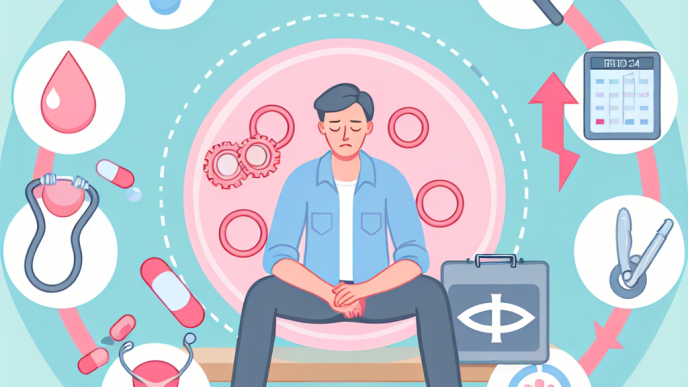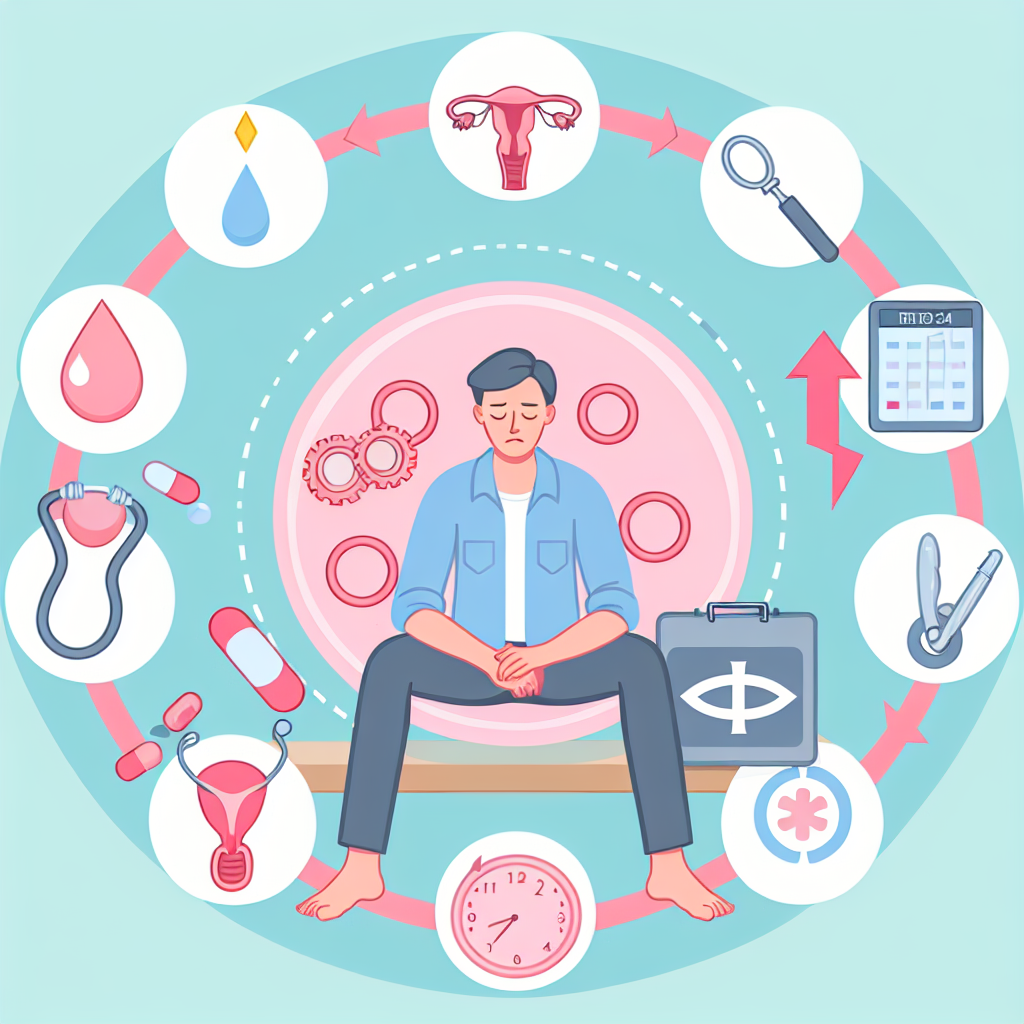-
Table of Contents
« Balance your hormones, conquer stress – Adapt with ease. »
Introduction
Adaptation au stress par la gestion des cycles hormonaux est une approche qui vise à aider les individus à mieux gérer leur stress en comprenant et en régulant leurs hormones. Le stress peut avoir un impact négatif sur notre santé physique et mentale, et il est donc important de trouver des moyens efficaces pour y faire face. En utilisant des techniques de gestion des cycles hormonaux, il est possible de réduire les effets du stress sur notre corps et notre esprit, et ainsi améliorer notre bien-être global. Dans cet article, nous allons explorer plus en détail cette méthode et ses avantages potentiels.
The Role of Hormones in Managing Stress: Understanding the Connection
Stress is an inevitable part of life. Whether it’s due to work, relationships, or other external factors, we all experience stress at some point. While a certain level of stress can be beneficial in motivating us to take action, chronic stress can have detrimental effects on our physical and mental well-being. This is where the role of hormones comes into play.
Hormones are chemical messengers that regulate various bodily functions, including our response to stress. When we encounter a stressful situation, our body releases hormones such as cortisol and adrenaline, which prepare us for the « fight or flight » response. This response is essential in helping us deal with immediate threats, but when stress becomes chronic, it can lead to an imbalance in our hormones and have negative consequences on our health.
One of the key hormones involved in managing stress is cortisol. Produced by the adrenal glands, cortisol helps regulate our body’s response to stress by increasing blood sugar levels, suppressing the immune system, and aiding in the metabolism of fats, carbohydrates, and proteins. However, when cortisol levels remain elevated for extended periods, it can lead to a weakened immune system, weight gain, and other health issues.
Another hormone that plays a crucial role in managing stress is oxytocin. Often referred to as the « love hormone, » oxytocin is released during social bonding and intimacy. It has been found to have a calming effect on the body, reducing cortisol levels and promoting feelings of relaxation and trust. This is why spending time with loved ones or engaging in activities that bring us joy can help alleviate stress.
In addition to cortisol and oxytocin, other hormones such as estrogen, progesterone, and testosterone also play a role in managing stress. These hormones fluctuate throughout the menstrual cycle, and research has shown that women may be more susceptible to stress during certain phases of their cycle. For example, during the premenstrual phase, when estrogen and progesterone levels drop, women may experience increased irritability and mood swings, making them more vulnerable to stress.
Understanding the connection between hormones and stress can help us better manage our stress levels. One way to do this is through the practice of mindfulness. Mindfulness involves being present in the moment and paying attention to our thoughts and feelings without judgment. By being mindful, we can become more aware of our stress triggers and learn to respond to them in a more positive and healthy way.
Another way to manage stress through hormones is by adopting a healthy lifestyle. Regular exercise, a balanced diet, and adequate sleep can help regulate our hormones and reduce stress levels. Exercise, in particular, has been found to increase the production of endorphins, also known as the « feel-good » hormones, which can help counteract the effects of cortisol.
In addition to lifestyle changes, there are also natural supplements that can help regulate hormones and manage stress. Adaptogenic herbs, such as ashwagandha and rhodiola, have been used for centuries in traditional medicine to help the body adapt to stress. These herbs work by supporting the adrenal glands and balancing cortisol levels.
In conclusion, hormones play a crucial role in managing stress. When our hormones are in balance, we are better equipped to handle stress and maintain our overall well-being. By understanding the connection between hormones and stress, we can take proactive steps to manage our stress levels and lead a healthier and more balanced life. Whether it’s through mindfulness, lifestyle changes, or natural supplements, there are various ways to support our hormones and adapt to stress in a healthy and sustainable way.
Adapting to Stress Through Hormonal Cycles: Strategies and Techniques
Adapting to stress is an essential skill in today’s fast-paced and demanding world. Stress can come from various sources, such as work, relationships, and personal responsibilities. While some stress can be beneficial in motivating us to achieve our goals, chronic stress can have detrimental effects on our physical and mental well-being. Therefore, it is crucial to find effective ways to manage and adapt to stress. One approach that has gained attention in recent years is through the management of hormonal cycles.
Hormones are chemical messengers that regulate various bodily functions, including our response to stress. When we experience stress, our body releases hormones such as cortisol and adrenaline, which prepare us for the fight or flight response. While this response can be helpful in short-term stressful situations, prolonged exposure to stress can disrupt our hormonal balance and lead to negative consequences.
One way to manage stress through hormonal cycles is by understanding and working with our natural hormonal fluctuations. Women, in particular, experience monthly hormonal changes due to their menstrual cycle. These changes can affect their response to stress and their overall well-being. By tracking their menstrual cycle and understanding how their hormones affect their mood and energy levels, women can plan their activities and responsibilities accordingly. For instance, during the ovulation phase, when estrogen levels are high, women may feel more energetic and social, making it an ideal time for social events or physical activities. On the other hand, during the premenstrual phase, when progesterone levels are high, women may feel more fatigued and irritable, making it a good time to prioritize self-care and relaxation.
Another strategy for adapting to stress through hormonal cycles is by incorporating stress-reducing activities into our daily routine. Exercise, for example, has been shown to have a positive impact on hormonal balance and stress management. Regular physical activity can help regulate cortisol levels and increase the production of endorphins, which are natural mood-boosters. Additionally, incorporating relaxation techniques such as yoga, meditation, or deep breathing can also help reduce stress and promote hormonal balance.
Furthermore, nutrition plays a crucial role in managing hormonal cycles and adapting to stress. Eating a well-balanced diet that includes whole foods, healthy fats, and lean proteins can help regulate hormones and reduce stress levels. On the other hand, consuming excessive amounts of sugar, caffeine, and processed foods can disrupt hormonal balance and increase stress levels. Therefore, it is essential to pay attention to our diet and make healthy choices to support our hormonal health.
In addition to these strategies, there are also specific techniques that can help manage stress through hormonal cycles. One such technique is called seed cycling, which involves consuming specific seeds during different phases of the menstrual cycle to support hormonal balance. For instance, during the follicular phase, when estrogen levels are rising, consuming flax and pumpkin seeds can help support estrogen production. During the luteal phase, when progesterone levels are high, consuming sesame and sunflower seeds can help support progesterone production. While there is limited scientific evidence to support this technique, many women have reported positive results in managing their hormonal balance and stress levels.
In conclusion, adapting to stress through hormonal cycles is a holistic approach that takes into account the natural fluctuations of our hormones and how they affect our response to stress. By understanding our hormonal patterns, incorporating stress-reducing activities into our daily routine, and making healthy lifestyle choices, we can effectively manage stress and promote overall well-being. It is essential to remember that everyone’s hormonal cycles are unique, and what works for one person may not work for another. Therefore, it is crucial to listen to our bodies and find the strategies and techniques that work best for us in managing stress and promoting hormonal balance.
Hormonal Balance for Stress Management: Tips and Tricks for a Healthier Mind and Body
Stress is an inevitable part of life. Whether it’s due to work, relationships, or other external factors, we all experience stress at some point. While a certain level of stress can be beneficial in motivating us to take action, chronic stress can have detrimental effects on our physical and mental well-being. This is where hormonal balance comes into play.
Our hormones play a crucial role in regulating our body’s response to stress. When we experience stress, our body releases hormones such as cortisol and adrenaline, which prepare us for the « fight or flight » response. However, if this response is constantly activated, it can lead to a state of chronic stress, which can have negative effects on our health.
One way to manage stress is by understanding and managing our hormonal cycles. Our hormones fluctuate throughout the day and throughout our menstrual cycle (for women). By understanding these cycles, we can make lifestyle changes and adopt strategies to better manage stress and promote hormonal balance.
The first step in managing hormonal balance for stress management is to identify the signs and symptoms of hormonal imbalance. These can include irregular periods, mood swings, fatigue, weight gain, and difficulty sleeping. If you experience any of these symptoms, it’s important to consult with a healthcare professional to determine if hormonal imbalance is the root cause.
Once you have identified hormonal imbalance as a contributing factor to your stress, there are several tips and tricks you can incorporate into your daily routine to promote hormonal balance and manage stress.
Firstly, it’s important to prioritize self-care. This includes getting enough sleep, eating a balanced and nutritious diet, and engaging in regular physical activity. Lack of sleep and poor nutrition can disrupt our hormonal balance and make us more susceptible to stress. Exercise, on the other hand, can help regulate our hormones and reduce stress levels.
In addition to self-care, incorporating relaxation techniques into your daily routine can also help manage stress and promote hormonal balance. This can include practices such as meditation, deep breathing, and yoga. These techniques can help reduce the levels of stress hormones in our body and promote a sense of calm and well-being.
Another important aspect of managing hormonal balance for stress management is to be mindful of our caffeine and alcohol intake. While caffeine can give us a temporary energy boost, it can also disrupt our hormonal balance and increase stress levels. Similarly, excessive alcohol consumption can also have negative effects on our hormones and contribute to stress.
In addition to these lifestyle changes, there are also supplements and herbs that can help promote hormonal balance and manage stress. Adaptogenic herbs, such as ashwagandha and rhodiola, have been shown to help regulate cortisol levels and reduce stress. Omega-3 fatty acids, found in fish oil, can also help regulate hormones and reduce inflammation in the body, which can be beneficial for managing stress.
Lastly, it’s important to remember that managing stress and promoting hormonal balance is an ongoing process. It’s important to listen to your body and make adjustments as needed. This may include seeking support from a therapist or counselor, practicing self-care, and incorporating stress-management techniques into your daily routine.
In conclusion, hormonal balance plays a crucial role in managing stress and promoting overall well-being. By understanding our hormonal cycles and making lifestyle changes, such as prioritizing self-care, incorporating relaxation techniques, and being mindful of our caffeine and alcohol intake, we can better manage stress and promote hormonal balance. Remember to listen to your body and seek support when needed, as managing stress and promoting hormonal balance is an ongoing process.
Q&A
1) Qu’est-ce que l’adaptation au stress par la gestion des cycles hormonaux ?
L’adaptation au stress par la gestion des cycles hormonaux est une approche qui vise à réguler les hormones du stress dans le corps afin de mieux gérer les réponses physiologiques et émotionnelles au stress.
2) Comment fonctionne cette méthode d’adaptation au stress ?
Cette méthode implique généralement des techniques de relaxation, de respiration et de méditation pour réguler les hormones du stress telles que le cortisol et l’adrénaline. Elle peut également inclure des changements dans l’alimentation et le mode de vie pour soutenir un équilibre hormonal sain.
3) Quels sont les avantages de l’adaptation au stress par la gestion des cycles hormonaux ?
Les avantages potentiels de cette méthode incluent une réduction du stress et de l’anxiété, une amélioration de la qualité du sommeil, une augmentation de l’énergie et une meilleure gestion des émotions. Elle peut également avoir un impact positif sur la santé globale en réduisant le risque de maladies liées au stress chronique.











